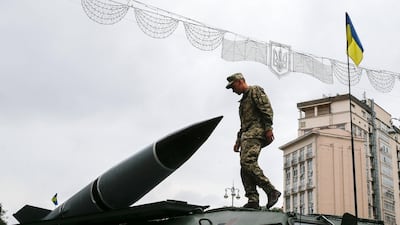Hopes for a solution to the Ukrainian conflict were raised on Tuesday after a closed-door meeting in Minsk between the US special envoy to Ukraine and a top Russian government aide was described as useful and constructive by the Kremlin representative.
Kurt Volker, of the US, and Vladislav Surkov met for three hours to discuss the conflict in Ukraine's Donbass region.
"We agreed that the current situation in the south-east of Ukraine cannot suit either the conflicting parties or the external forces contributing to the settlement," Mr Surkov said after Monday's talks.
"The discussion was conducted in the tone of mutual respect and interest, honestly, seriously, without illusions and bias. The commitment to the Minsk agreements was not questioned. Both sides proposed fresh ideas and innovative approaches to their implementation."
Mr Volker has yet to make any statement after the meeting, which was held to give renewed emphasis to ending the conflict between the Ukrainian government and pro-Russian separatists in the Donbass.
The conflict flared in 2014 after Russia annexed the Crimea. Despite a peace deal signed in Minsk more than two years ago, the conflict in the Donbass is continuing, and the military and civilian toll is rising every day.
Over the past six months, more than 400 civilians have become victims of the war.
It remains one of the main destabilising factors in Europe, despite having cooled somewhat recently.
The lack of progress on a solution is one of the main reasons for the persistence of sanctions against Russia.
But resolving the Ukrainian situation will allow the US and Russia to make advances on other world problems, including Syria and North Korea.
The appointment of Mr Volker last month was important. Over the past two months he has had several consultations with Ukrainian authorities on different levels. In negotiations with Mr Surkov he represents not only the US side, but also Ukraine, where he is perceived positively.
In general, the meeting of two high-ranking representatives is already huge progress.
In the time since the Minsk agreements, the parties have not advanced in implementing the accords.
Ukraine is not satisfied with the ceasefire and lack of security guarantees.
At the same time, the self-proclaimed republics of Donbass are dissatisfied that Kiev will not make political concessions. As a result, it became clear that without direct negotiations between Washington and Moscow, there could be no route to peace.
Anton Kuchuhidze, a Ukrainian expert in international affairs, said that Monday's discussions would have been in line with previous meetings between the US and Russia, including talks between Russian foreign minister Sergey Lavrov and US secretary of state Rex Tillerson.
"The agenda of the meeting was partially voiced during the meeting between Lavrov and Tillerson," Mr Kuchuhidze said.
"At the meeting, Volker and Surkov were definitely working on a set of mechanisms that could already move them from the dead end."
The main hurdle to resuscitating the Minsk agreements is the security guarantee, which is very difficult to organise but a priority for the Americans. Without guaranteeing compliance with the ceasefire, there will be no political change in the granting of special status to the Donbass.
Russia is ready to compromise on the issue.
An important new mechanism for this solution could be an expansion of the monitoring mission by the Organisation for Security and Co-operation in Europe.
"The expansion of the OSCE mandate could be an excellent diplomatic signal that would testify to the growing trust of the parties to each other," said Mr Kuchuhidze.
An important issue that would have been raised in talks between Mr Volker and Mr Surkov was the exchange of prisoners of war. In the past year, this process has been frozen because of a deterioration in communications between Ukraine and the republics.
Preliminary information suggests that 137 Ukrainians are being held in the Donbass. Another 231 people are detained by Kiev.
"Details of the meeting will most probably not be disclosed, but it can be noted right now that the fact that it took place indicates the possibility of hoping for progress in the framework of the Minsk process," said Aleksey Dzermant, a Belarusian political scientist.
"The main thing is that there is direct contact of the parties [Russia and the US], on which the resolution of the crisis in the east of Ukraine depends.
"The meeting was attended by people with the competence and authority to settle it. This is the first step but the specifics will appear later."
The next stop for Mr Volker is Lithuania, where the Ukrainian issue will be discussed at the European level.

